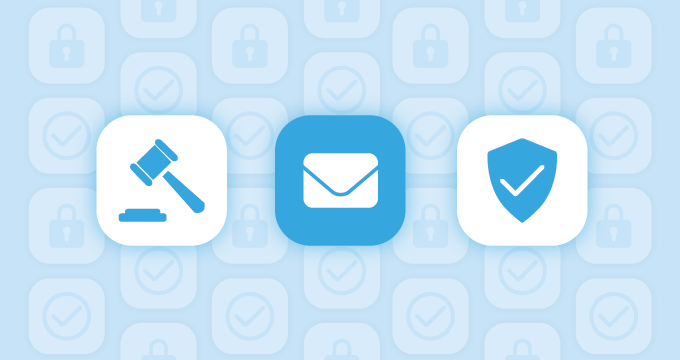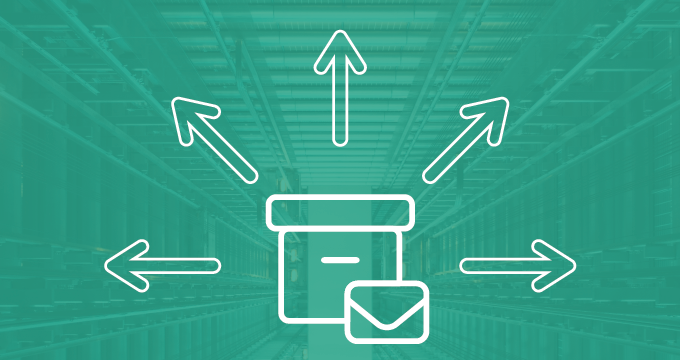The Electronic Communications Privacy Act (ECPA) is a crucial piece of legislation that has determined the way businesses and organizations handle electronic communications for nearly four decades.
Enacted in 1986, the ECPA was designed to address privacy concerns in an era when electronic communication was rapidly expanding. However, with today’s advanced technologies, understanding and complying with the ECPA has become more complex and challenging.
For companies operating in regulated industries such as finance, healthcare, and government, staying compliant with the ECPA is a critical aspect of maintaining trust and protecting sensitive information.
In this comprehensive guide, we’ll discuss:
- The background of ECPA and its purpose
- The amendments to the original law
- The impact it has on business operations
- ECPA violation examples
- Best practices for ECPA compliance
- The importance of data archiving
This blog post offers a detailed overview of the ECPA and its implications, but don’t take it as legal advice. For specific legal guidance, consult with legal professionals who specialize in electronic communications law.
What Is ECPA?
The core purpose of the Electronic Communications Privacy Act (ECPA) is to protect the privacy of various forms of electronic communications, including telephone calls, emails, and electronically stored data.
Why was the ECPA enacted?
The mid-1980s witnessed a surge in the use of digital communication technologies.
With more people relying on emails, digital files, and other electronic means to communicate and store information, there was a need for a legal framework to protect these communications.
Before the ECPA, the primary law governing communication privacy was the Wiretap Act of 1968, which was largely focused on voice communications over traditional telephone lines. As new technologies emerged, this older law proved insufficient to address the privacy concerns of modern electronic communications.
Key provisions of the ECPA
The ECPA consists of three major parts, each addressing different aspects of electronic communications:
Title I: The Wiretap Act
Title I of the ECPA extends the original Wiretap Act to cover electronic communications.
It prohibits the intentional interception, use, and disclosure of electronic communications unless specific exceptions apply, such as obtaining consent from one of the parties involved. In practice, this means that it’s illegal to listen to someone’s oral, wire, or electronic communication or record it without consent.
Similarly, such illegally obtained communications can’t be used as evidence. It should be emphasized that this particular Title governs only electronic data being transmitted in real-time, such as phone calls, live messages, or active internet communications.
Title II: The Stored Communications Act (SCA)
The SCA governs the access to and disclosure of electronic communications stored by third-party service providers, such as emails stored on a server. It offers varying levels of protection depending on the type and age of the data.
For this reason, it’s particularly relevant for businesses that handle sensitive or personal information.
A key point of contention is the SCA’s 180-day rule, which deems communications older than 180 days as “abandoned” and thus subject to access with a subpoena rather than a warrant. This rule is considered outdated since there’s no need for users to download a message from the server. As data is often stored indefinitely in the cloud today, there are concerns that older, potentially sensitive communications lack adequate protection.
The Email Privacy Act was introduced multiple times in Congress, and it sought to update the SCA by eliminating the 180-day rule and ensuring that all electronic communications, regardless of how long they’ve been stored, are protected by the warrant requirement. However, this Act wasn’t passed into law since it failed to gain sufficient bipartisan support in the Senate.
Title III: The Pen Register Act
This Act regulates the use of devices that capture dialing, routing, addressing, and signaling information.
It requires law enforcement agencies to obtain a court order before using such devices, ensuring that the collection of this data is legally sanctioned.
Unlike the Wiretap Act, which focuses on the content of communications, the Pen Register Act deals with the collection of metadata — information about the communication rather than the communication itself. While the content of communications is not captured, the metadata can still reveal significant personal information. As digital communication evolves, the distinction between content and metadata blurs, raising new privacy issues.
Service providers must ensure legal orders are obtained before assisting with these devices, balancing law enforcement needs with privacy rights. Businesses handling large volumes of communications should be aware of these requirements to avoid privacy violations.
ECPA Amendments
Over the years, there have been several updates to the ECPA to accommodate new technologies and security challenges. These include:
The Communications Assistance for Law Enforcement Act (CALEA) of 1994
Enacted in 1994, CALEA was designed to ensure that law enforcement agencies could maintain their ability to conduct electronic surveillance, even as telecommunications technology advanced.
In short, CALEA requires telcos and equipment manufacturers to build surveillance capabilities into their systems with the purpose of making it easier for law enforcement to execute wiretaps and access communications in real time when authorized by a court order.
While CALEA did not directly amend the ECPA, it expanded the scope of government surveillance capabilities, which are regulated by the ECPA. The law mandates that service providers cooperate with law enforcement to facilitate the interception of electronic communications, as governed by the Wiretap Act (Title I of the ECPA).
Under CALEA, telecommunications providers, including broadband internet and VoIP services, are required to design their systems to be wiretap-friendly. This means that companies must ensure their networks can accommodate lawful interception requests without compromising the privacy of other users.
The USA PATRIOT Act (2001)
One of the most significant amendments to the ECPA came with the passage of the USA PATRIOT Act in 2001. In response to the 9/11 attacks, this act expanded the surveillance powers of law enforcement agencies, including broader authority to intercept electronic communications under Title I of the ECPA. Under this amendment, the government was allowed to monitor certain communications more easily in the name of national security, which raised concerns about privacy and civil liberties.
The PATRIOT Act also expanded the use of pen registers and trap-and-trace devices under Title III of the ECPA. This meant that these devices became easier to deploy without a court order, especially in cases involving terrorism or foreign intelligence.
Reauthorization of USA PATRIOT Act (2006)
The original legislation was reauthorized and expanded in 2006 to extend and, in some cases, broaden the surveillance powers of law enforcement agencies.
Under the Patriot Act, the government was granted greater authority to monitor electronic communications, including email, internet usage, and other forms of digital data.
The Patriot Act of 2006 made several amendments to the ECPA, particularly in relation to the Stored Communications Act (Title II of the ECPA). The law lowered the threshold for obtaining access to stored electronic communications, making it easier for law enforcement to access emails and other data without a warrant under certain conditions.
State privacy bills
Over the past few years, a number of states, including California, Colorado, Connecticut, and Virginia, introduced their own privacy bills. In several other states, such as Delaware, Indiana, Iowa, and Kentucky, privacy legislation will be enacted in the upcoming months, reflecting a growing trend toward state-level data protection laws across the U.S.
Thanks to state privacy acts, residents of these states have the right to opt out of targeted advertising and request that businesses edit or delete their personal data.
ECPA Violation Examples
Unauthorized interception of communications
Intercepting electronic communications, such as emails, phone calls, or text messages, without consent or legal authorization is a direct violation of the ECPA.
For instance, an employer secretly monitoring employees’ personal emails or phone calls without their knowledge or consent would likely breach the Wiretap Act (Title I of the ECPA). Note that monitoring employees’ workplace communication channels doesn’t constitute an ECPA violation, especially if outlined in the employment contract.
Illegal access to stored electronic data or gaining unauthorized access to stored electronic communications, such as emails or files on a server, can violate the Stored Communications Act (Title II of the ECPA). An example would be a company accessing and reading an employee’s personal emails stored on a work server without proper authorization or a warrant.
Again, workplace emails stored on a work server are an entirely different case since these communications are often considered company property.
Use of pen registers without proper authorization
Using pen registers or trap and trace devices to collect dialing, routing, addressing, or signaling information without obtaining a court order is another common violation.
For example, law enforcement agencies or private entities that track phone call metadata without the required legal process would be in violation of Title III of the ECPA.
Accessing communications beyond the scope of consent
Even when one party consents to the interception of communications, accessing or using the intercepted information for purposes beyond the agreed scope can be a violation.
For example, if a person consents to monitoring for security purposes, but the information is later used for unrelated disciplinary action, it could constitute an ECPA violation.
Best Practices for Ensuring ECPA Compliance
The ECPA and its subsequent amendments and laws that contradict it present a challenge to businesses and organizations to stay compliant.
Here are some best practices to follow to protect sensitive data:
Develop a clear privacy policy
Create a privacy policy that clearly outlines how electronic communications are monitored, stored, and accessed within the organization. This policy should be communicated to all employees, ensuring they understand their rights and the company’s obligations under the ECPA.
Implement procedures to obtain explicit consent from employees or customers when monitoring their communications. This is particularly important under the Wiretap Act, where consent is often required to legally intercept communications.
Continuously update the privacy policy to reflect changes in technology, business practices, and legal requirements. This ensures ongoing compliance as new challenges emerge.
Implement secure data management practices
To protect sensitive information, it’s essential to ensure that all electronic communications, including emails and stored data, are encrypted both at rest and in transit. Encryption safeguards data from unauthorized access, providing a strong layer of security.
In addition to encryption, access to stored communications should be restricted to authorized personnel only. Implementing role-based access controls allows employees to access only the data necessary for their specific roles, minimizing the risk of unnecessary exposure.
Finally, data retention policies that align with the ECPA requirements must be developed and enforced. Establish appropriate retention periods for different types of communications and ensure that data is securely deleted when it is no longer needed, reducing the risk of non-compliance or data breaches.
Regular training and audits
Regularly conduct training sessions to educate employees about their responsibilities under the ECPA, including the legal boundaries of communication monitoring and the correct handling of electronic communications.
In addition to training, perform routine audits of communication practices and data management systems to ensure compliance with ECPA standards. These audits are crucial for identifying potential areas of non-compliance and taking corrective action before issues escalate.
Consult legal experts
To ensure compliance and avoid significant fines as well as potential criminal changes and liability, it’s best to consult legal experts who specialize in electronic communications law to review your organization’s practices and policies. This can provide an additional layer of protection and ensure that your organization is fully compliant with the ECPA.
The Role of Data Archiving in Ensuring ECPA Compliance
Data archiving is critical for ensuring compliance with the Electronic Communications Privacy Act (ECPA), particularly under the Stored Communications Act (SCA). Effective archiving practices allow for securely storing electronic communications and ensuring they are accessible when needed, which is crucial for legal compliance and responding to audits or ediscovery requests.
Organizations that are required to retain data over a specific period of time should implement an automated archiving system capable of capturing and storing all electronic communications, including emails, texts, and instant messages.
Opt for an archiving solution like Jatheon that provides robust security features like encryption, access controls, and customizable user roles. These measures protect archived communications from unauthorized access, ensuring that data remains secure over time.
Jatheon also includes advanced indexing, message integrity verification, and search capabilities that make it easy to retrieve specific communications when required for legal purposes, particularly when responding to subpoenas or other legal requests under the ECPA.
Summary of the Main Points
- The Electronic Communications Privacy Act (ECPA) is a foundational law that governs the privacy and access of electronic communications in the U.S., particularly focusing on issues like wiretapping, stored communications, and the use of pen registers.
- It consists of Title I, or the Wiretap Act, which protects real-time electronic communications; Title II, or the Stored Communications Act, which governs the access and disclosure of stored data; and Title III, or the Pen Register Act, which regulates the use of devices that capture dialing, routing, addressing, and signaling information.
- Despite several updates over decades, the ECPA still struggles to keep pace with modern technology, leaving gaps in privacy protections for emerging forms of communication.
- Organizations, businesses, and agencies need to stay vigilant and proactive in ensuring compliance with the ECPA, especially because there are other laws that may oppose it. It’s necessary to update privacy policies and data management practices to secure electronic communications.
To learn how Jatheon’s cloud archiving software can help your agency ensure ECPA compliance, contact us or book a demo.
FAQ
What are the penalties and fines for ECPA violations?
Penalties for violating the ECPA can be severe, including both criminal and civil consequences. Criminal fines can reach up to $250,000 for individuals and up to $500,000 for organizations per violation. Additionally, individuals may face imprisonment for up to five years. Civil penalties include statutory damages of at least $10,000 per violation, with the possibility of higher actual damages, punitive damages, and reimbursement of the victim’s legal fees.
What is the 180-day rule?
Under this SCA rule, communications stored for 180 days or less require a warrant for government access, while those stored for more than 180 days without being used are considered abandoned and can be accessed with a subpoena, which has a lower legal threshold. Given that, nowadays, data is often stored indefinitely, this rule leads to concerns about the adequacy of privacy protections for older communications.
What are some exceptions to the ECPA?
The ECPA includes several exceptions that permit the interception or access to electronic communications without violating the law. One key exception is consent, where interception is lawful if one of the parties involved consents. Service providers are also allowed to access communications for managing their services or protecting their rights. Law enforcement agencies can access communications with a court order, warrant, or in emergency situations where there is an immediate threat to life or safety. Similarly, employers may monitor employee workplace communications, particularly if employees have been informed about this practice.
Read Next:How to Manage Public Record Compliance with FOIA Software |











